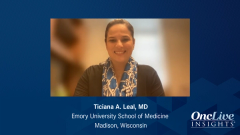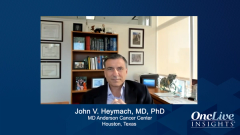
Optimizing the Use of Molecular Profiling in Non–Small Cell Lung Cancer
Meghan Mooradian, MD, highlights best practices for identifying molecular alterations in NSCLC and addresses barriers to testing.
Episodes in this series

Transcript:
Meghan J. Mooradian, MD: I think an important question that many clinicians are faced with now is whether to use blood-based assays, tissue-based assays, or both. Historically, tissue-based testing and tissue-based next-generation sequencing are the gold standard and have been considered the gold standard in identifying molecular alterations. That being said, in recent years we have been growing more adept at using some of these blood-based assays to identify potential target alterations. In my clinical practice, I still uniformly attempt to have next-generation sequencing performed on tissue testing. However, I will often send these assays in concert. For example, meeting a patient in clinic, if there’s tumor tissue available asking our molecular pathologist to run testing, and at the same point in time sending off an approved blood-based assay to get additional molecular testing on blood. What we’ve seen from clinical studies is that there’s a good deal of concordance between these different types of assays so finding molecular alteration in the blood, we very commonly then find that molecular alteration in the tissue. That being said, we know there’s some heterogeneity between molecular alterations at different tumor types but using these 2 together can enrich finding a molecular alteration.
Current guidelines state that molecular testing should be conducted at the time of initial diagnosis as well as tumor progression on targeted therapies. In my clinical practice, all patients with a new diagnosis of unresectable stage IV non–small cell adenocarcinoma will undergo next-generation sequencing by tumor testing as well as potentially blood testing. Then the patients with the targetable alteration, particularly those where we know actionable mutations are present, will undergo testing at the time of progression. Within the last year, we’ve now seen approvals for tyrosine kinase inhibitors in the adjuvant setting, particularly in EGFR-mutated lung cancer. At this point in time, I’m also routinely testing my patients with stage Ib to stage III non–small cell lung cancer for the presence of an activating EGFR mutation.
We know at this point that there are several barriers with routine genomic testing. Looking at some data that was presented at last year’s ASCO [American Society of Clinical Oncology annual meeting], we could see that when community doctors were pulled and chart reviews were performed, less than 50% of patients were getting regular genetic testing in some of the 4 most common biomarkers such as EGFR, ALK, ROS1, and BRAF. Really showcasing that there’s a portion of patients where this very crucial testing is not being done. Barriers include education, understanding that the landscape is rapidly changing, new targets have been identified, there are new drugs to be used, and there are some challenges when it comes to tissue acquisition. Potentially, if there is insufficient tumor tissue, this broad-based next-generation sequencing cannot be performed, so understanding the potential application of ctDNA [circulating tumor DNA] at that point. Education in terms of some of our subspecialists—our pathologists and our interventional pulmonologists—both of which can help ensure that we are obtaining adequate tumor tissue. Then also it’s possible that some of this reflex testing can be done not only when it comes to these biomarkers, such as EGFR, ALK, but also with PD-L1 [programmed death-ligand 1] IHC [immunohistochemistry] to understand where immunotherapy may fit in.
Transcript edited for clarity.







































